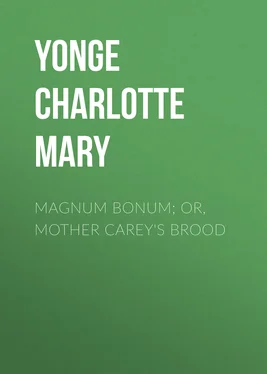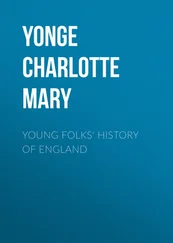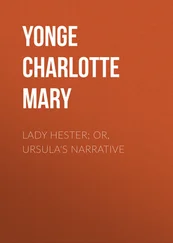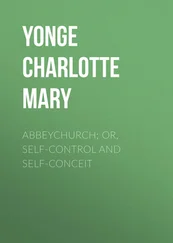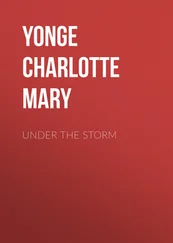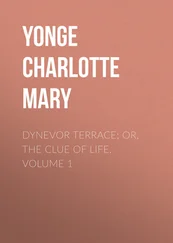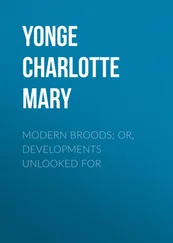Charlotte Yonge - Magnum Bonum; Or, Mother Carey's Brood
Здесь есть возможность читать онлайн «Charlotte Yonge - Magnum Bonum; Or, Mother Carey's Brood» — ознакомительный отрывок электронной книги совершенно бесплатно, а после прочтения отрывка купить полную версию. В некоторых случаях можно слушать аудио, скачать через торрент в формате fb2 и присутствует краткое содержание. Издательство: Иностранный паблик, Жанр: foreign_prose, literature_19, Европейская старинная литература, foreign_antique, на английском языке. Описание произведения, (предисловие) а так же отзывы посетителей доступны на портале библиотеки ЛибКат.
- Название:Magnum Bonum; Or, Mother Carey's Brood
- Автор:
- Издательство:Иностранный паблик
- Жанр:
- Год:неизвестен
- ISBN:нет данных
- Рейтинг книги:5 / 5. Голосов: 1
-
Избранное:Добавить в избранное
- Отзывы:
-
Ваша оценка:
- 100
- 1
- 2
- 3
- 4
- 5
Magnum Bonum; Or, Mother Carey's Brood: краткое содержание, описание и аннотация
Предлагаем к чтению аннотацию, описание, краткое содержание или предисловие (зависит от того, что написал сам автор книги «Magnum Bonum; Or, Mother Carey's Brood»). Если вы не нашли необходимую информацию о книге — напишите в комментариях, мы постараемся отыскать её.
Magnum Bonum; Or, Mother Carey's Brood — читать онлайн ознакомительный отрывок
Ниже представлен текст книги, разбитый по страницам. Система сохранения места последней прочитанной страницы, позволяет с удобством читать онлайн бесплатно книгу «Magnum Bonum; Or, Mother Carey's Brood», без необходимости каждый раз заново искать на чём Вы остановились. Поставьте закладку, и сможете в любой момент перейти на страницу, на которой закончили чтение.
Интервал:
Закладка:
“Well, I didn’t see why she shouldn’t enjoy herself.”
“Now you’ve been and lost her. Poll, Poll!”
“I have her!” called back Mr. Ogilvie. “I’ll bring her to the gate.”
Thanks came through the hedge, and the brother and sister walked on.
“It’s old Ogre. Cut!” growled in what was meant to be an aside, a voice the master knew full well, and there was a rushing off of feet, like ponies in a field.
When the sheep gate was reached, a great furniture van was seen standing at the door of the “Folly,” and there appeared a troop of boys and girls in black, eager to welcome their pet.
“Thank you, sir; thank you very much. Come, Polly,” said the eldest boy, taking possession of the bird.
“I think we have met before,” said the schoolmaster to the younger ones, glad to see that two—i.e. the new Robert and Armine Brownlow—had not joined in the sauve qui peut.
Nay, Robert turned and said, “Mother, it is Mr. Ogilvie.”
Then that gentleman was aware that one of the black figures had a widow’s cap, with streamers flying behind her in the breeze, but while he was taking off his hat and beginning, “Mrs. Brownlow,” she held out her hands to his sister, crying, “Mary, Mary Ogilvie,” and there was an equally fervent response. “Is it? Is it really Caroline Allen?” and the two friends linked eager hands in glad pressure, turning, after the first moment, towards the house, while Mary said, “David, it is my dear old schoolfellow; Carey, this is my brother.”
“You were very kind to these boys,” said Carey, warmly shaking hands with him. “The name sounded friendly, but I little thought you were Mary’s brother. Are you living here, Mary? How delightful!”
“Alas, no; I am only keeping holiday with David. I go back to-morrow.”
“Then stay now, stay and let me get all I can of you, in this frightful muddle,” entreated Caroline. “Chaos is come again, but you won’t mind.”
“I’ll come and help you,” said Mary. “David, you must go on alone and come back for me.”
“Can’t I be of use?” offered David, feeling rather shut out in the cold; “I see a bookcase. Isn’t that in my line?”
“And here’s the box with its books,” said Janet. “Oh! mother, do let that be finished off at least! Bobus, there are the shelves, and I have all their pegs in my basket.”
The case was happily in its place against the wall, and Janet had seized on her recruit to hold the shelves while she pegged them, while the two friends were still exchanging their first inquiries, Carey exclaiming, “Now, you naughty Mary, where have you been, and why didn’t you write?”
“I have been in Russia, and I didn’t write, because nobody answered, and I didn’t know where anybody was.”
“In Russia! I thought you were with a Scottish family, and wrote to you to the care of some laird with an unearthly name.”
“But you knew that they took me abroad.”
“And Alice Brown told me that letters sent to the place in Scotland would find you. I wrote three times, and when you did not answer my last—” and Caroline broke off with things unutterable in her face.
“I never had any but the first when you were going to London. I answered that. Yes, I did! Don’t look incredulous. I wrote from Sorrento.”
“That must have miscarried. Where did you address it.”
“To the old place, inside a letter to Mrs. Mercer.”
“I see! Poor Mrs. Mercer went away ill, and did not live long after, and I suppose her people never troubled themselves about her letters. But why did not you get ours.”
“Mrs. McIan died at Venice, and the aunts came out, and considering me too young to go on with the laird and his girls, they fairly made me over to a Russian family whom we had met. Unluckily, as I see now, I wrote to Mrs. Mercer, and as I never heard more I gave up writing. Then the Crimean War cut me off entirely even from David. I had only one letter all that time.”
“How is it that you are a governess? I thought one was sure of a pension from a Russian grandee!”
“These were not very grand grandees, only counts, and though they paid liberally, they could not pension one. So when I had done with the youngest daughter, I came to England and found a situation in London. I tried to look up our old set, but could not get on the track of anyone except Emily Collins, who told me you had married very soon, but was not even sure of your name. Very soon! Why, Caroline, your daughter looks as old as yourself.”
“I sometimes think she is older! And have you seen my Eton boy?”
“Was it he who received the delightful popinjay, who ‘Up and spak’ so much to the purpose?” asked Mr. Ogilvie.
“Yes, it was Allen. He is the only one you did not see in the morning. Did they do tolerably?”
“I only wish I had any boys who did half as well,” said Mr. Ogilvie, the lads being gone for more books.
“I was afraid for John and Armine, for we have been unsettled, and I could not go on so steadily with them as before,” she said eagerly, but faltering a little. “Armine told me he blundered in Phaedrus, but I hope he did fairly on the whole.”
“So well that if you ask my advice, I should say keep him to yourself two years more.”
“Oh! I am so glad,” with a little start of joy. “You’ll tell his uncle? He insisted—he had some impression that they were very naughty boys, whom I could not cope with, poor little fellows.”
“I can decidedly say he is learning more from you than he would in school among those with whom, at his age, I must place him.”
“Thank you, thank you. Then Babie won’t lose her companion. She wanted to go to school with Armie, having always gone on with him. And the other two—what of them? Bobus is sure to work for the mere pleasure of it—but Jock?”
“I don’t promise that he may not let himself down to the standard of his age and develop a capacity for idleness, but even he has time to spare, and he is at that time of life when boys do for one another what no one else can do for them.”
“The Colonel said the boys were a good set and gentlemanly,” said Carey wistfully.
“I think I may say that for them,” returned their master. “They are not bad boys as boys go. There is as much honour and kindliness among them as you would find anywhere. Besides, to boys like yours this would be only a preparatory school. They are sure to fly off to scholarships.”
“I don’t know,” said Carey. “I want them to be where physical science is an object. Or do you think that thorough classical training is a better preparation than taking up any individual line?”
“I believe it is easier to learn how to learn through languages than through anything else.”
“And to be taught how to learn is a much greater thing than to be crammed,” said Carey. “Of course when one begins to teach oneself, the world has become “mine oyster,” and one has the dagger. The point becomes how to sharpen the dagger.”
At that moment three or four young people rushed in with arms full of books, and announcing that the uncle and aunt were coming. The next moment they appeared, and stood amazed at the accession of volunteer auxiliaries. Mr. Ogilvie introduced his sister, while Caroline explained that she was an old friend,—meanwhile putting up a hand to feel for her cap, as she detected in Ellen’s eyes those words, “Caroline, your cap.”
“We came to see how you were getting on,” said the Colonel, kindly.
“Thank you, we are getting on capitally. And oh, Robert, Mr. Ogilvie will tell you; he thinks Armine too—too—I mean he thinks he had better not go into school yet,” she added, thankful that she had not said “too clever for the school.”
Читать дальшеИнтервал:
Закладка:
Похожие книги на «Magnum Bonum; Or, Mother Carey's Brood»
Представляем Вашему вниманию похожие книги на «Magnum Bonum; Or, Mother Carey's Brood» списком для выбора. Мы отобрали схожую по названию и смыслу литературу в надежде предоставить читателям больше вариантов отыскать новые, интересные, ещё непрочитанные произведения.
Обсуждение, отзывы о книге «Magnum Bonum; Or, Mother Carey's Brood» и просто собственные мнения читателей. Оставьте ваши комментарии, напишите, что Вы думаете о произведении, его смысле или главных героях. Укажите что конкретно понравилось, а что нет, и почему Вы так считаете.
